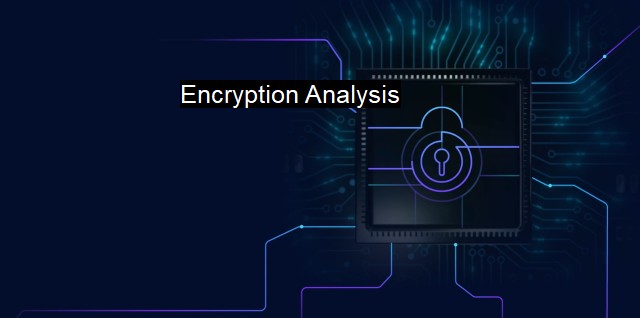What are Encryption Analysis?
Unlocking the Hidden Meanings: The Power of Encryption Analysis in Cybersecurity
Encryption analysis, often referred to as cryptanalysis, plays a critical role in cybersecurity. It is the systematic study and reverse engineering of cryptographic systems with the aimed purpose to breach those systems even without the initial encryption keys. before delving into the specifics of encryption analysis, it is important to understand the basics of encryption itself.Encryption, at its core, is a technique used to secure data in transit or at rest against unauthorized access. Its primary goal is to encode or transmogrify data in such a way that it remains unreadable without the relevant decryption keys. This process is carried out using algorithms, which can be symmetric (where the same key is used for encrypting and decrypting the data) or asymmetric (where two different keys are used -- a public key for encryption and a private key for decryption).
With a clear understanding of encryption, we revert to encryption analysis. It intervenes when malicious actors, notably hackers, but also ethical 'white-hat' hackers and security researchers, try to crack the encryption algorithms to either gain unauthorized access to the data or to check the robustness of the encryption used.
There are various methods that can be used for encryption analysis. The most common one is the "brute force" tactic. Here, an analyst tries every possible decryption key to unlock the protected data. While this method can be theoretically effective, it's often impractical due to the almost innumerable possibilities of keys, especially with modern encryption standards. Another common method is frequency analysis, where analysts study the frequency of specific characters or patterns of characters in a cipher to try to deduce the likely original characters. More modern techniques include side-channel attacks, which exploit the physical emissions of a system (like time, power consumption, etc.) to find potential discrepancies.
Encryption analysis is a crucial element as it serves multiple purposes. Firstly, it is used to test the unventilated solidity of encryption algorithms. In other words, the prevention and early detection of vulnerabilities in an encryption system are made possible with it. This is why companies proactively employ white-hat hackers to conduct these analyses, ensuring their systems can withstand any potential attacks. Secondly, encryption analysis can help in digital forensics and criminal investigations. This is to crack encryption systems that have been deployed by criminals while committing various felonies to hide digital footprints or stash away sensitive data.
In the world of antivirus software, encryption analysis also offers real value as it helps identify malware which uses encryption to hide its malicious intent. Some forms of malware use a technique called "cryptovirology" where they encrypt user's valuable data and hold it 'hostage' until a ransom is paid. With efficient encryption analysis, antiviruses can detect these activities and potentially crack the encryption used by the malware and unlock user’s valuable data.
It should also be acknowledged that while encryption analysis is perceived as a good mechanism in the proper hands, it can be a tool of exploitation and misappropriation in the wrong hands. It underlines the "double-edged sword" nature of encryption analysis in cybersecurity.
On that account, striking a balance is very necessary: promoting ethical encryption analysis for security improvements and policy design, while dissuading any malicious exploitation as far as possible. As technological advancements continue to inch forward, the complex dance between encryption and encryption analysis remains a fascinating and integral part of our continuous quest for adequate cybersecurity. From the antivirus perspective, it's a useful tool — a layer of scrutiny that helps to identify and mitigate threats more efficiently.

Encryption Analysis FAQs
What is encryption analysis?
Encryption analysis is a cybersecurity technique that involves analyzing and assessing the strength and effectiveness of encryption systems used to protect sensitive data.What are the key benefits of encryption analysis?
Encryption analysis can help organizations identify vulnerabilities in their encryption systems and take the necessary steps to strengthen them. This can improve the overall security of an organization's data and reduce the risk of data breaches.What tools are used for encryption analysis?
There are various tools available for encryption analysis, including software programs that can analyze encrypted data, algorithms used for encryption, and penetration testing tools used to assess the security of encryption systems.How does encryption analysis help in antivirus software?
Encryption analysis can help antivirus software detect and prevent malware attacks that use encrypted communication protocols. By analyzing the encryption used by malware, antivirus programs can identify and block malicious communications and prevent the spread of malware.| | A | | | B | | | C | | | D | | | E | | | F | | | G | | | H | | | I | | | J | | | K | | | L | | | M | |
| | N | | | O | | | P | | | Q | | | R | | | S | | | T | | | U | | | V | | | W | | | X | | | Y | | | Z | |
| | 1 | | | 2 | | | 3 | | | 4 | | | 7 | | | 8 | | |||||||